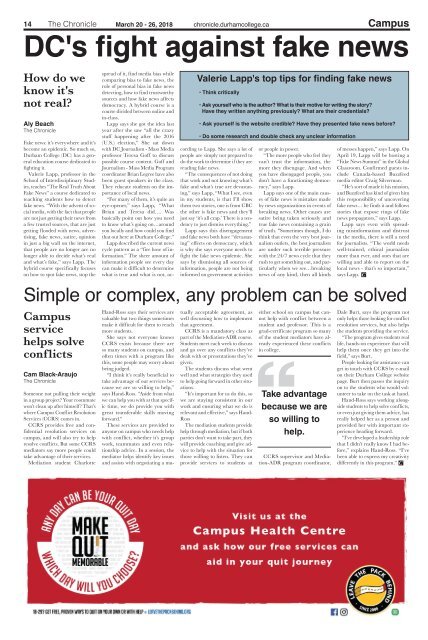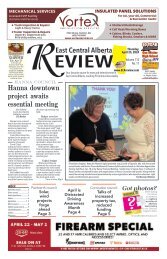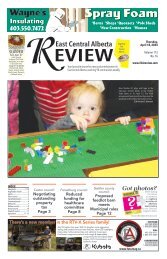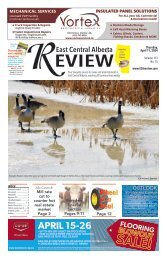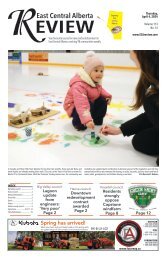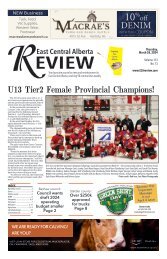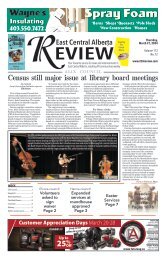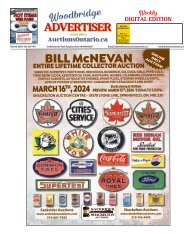Create successful ePaper yourself
Turn your PDF publications into a flip-book with our unique Google optimized e-Paper software.
14 The <strong>Chronicle</strong> March 20 - 26, 2018 chronicle.durhamcollege.ca Campus<br />
DC's fight against fake news<br />
How do we<br />
know it's<br />
not real?<br />
Aly Beach<br />
The <strong>Chronicle</strong><br />
Fake news: it’s everywhere and it’s<br />
become an epidemic. So much so,<br />
Durham College (DC) has a general<br />
education course dedicated to<br />
fighting it.<br />
Valerie Lapp, professor in the<br />
School of Interdisciplinary Studies,<br />
teaches “The Real Truth About<br />
Fake News” a course dedicated to<br />
teaching students how to detect<br />
fake news. “With the advent of social<br />
media, with the fact that people<br />
are not just getting their news from<br />
a few trusted sources, that are just<br />
getting flooded with news, advertising,<br />
fake news, satire, opinion<br />
in just a big w<strong>all</strong> on the internet,<br />
that people are no longer are no<br />
longer able to decide what’s real<br />
and what’s fake,” says Lapp. The<br />
hybrid course specific<strong>all</strong>y focuses<br />
on how to spot fake news, stop the<br />
Valerie Lapp's top tips for finding fake news<br />
• Think critic<strong>all</strong>y<br />
• Ask yourself who is the author? What is their motive for writing the story?<br />
Have they written anything previously? What are their credentials?<br />
• Ask yourself is the website credible? Have they presented fake news before?<br />
• Do some research and double check any unclear information<br />
spread of it, find media bias while<br />
comparing bias to fake news, the<br />
role of personal bias in fake news<br />
detecting, how to find trustworthy<br />
sources and how fake news affects<br />
democracy. A hybrid course is a<br />
course divided between online and<br />
in-class.<br />
Lapp says she got the idea last<br />
year after she saw “<strong>all</strong> the crazy<br />
stuff happening after the 2016<br />
(U.S.) election,” She sat down<br />
with DC Journalism - Mass Media<br />
professor Teresa Goff to discuss<br />
possible course content. Goff and<br />
Journalism - Mass Media Program<br />
coordinator Brian Legree have also<br />
been guest speakers in the class.<br />
They educate students on the importance<br />
of local news.<br />
“For many of them, it’s quite an<br />
eye-opener,” says Lapp, “What<br />
Brian and Teresa did…. Was<br />
basic<strong>all</strong>y point out how you need<br />
to know what’s going on…around<br />
you loc<strong>all</strong>y and how could you find<br />
that out here at Durham College.”<br />
Lapp described the current news<br />
cycle pattern as a “fire hose of information.”<br />
The sheer amount of<br />
information people see every day<br />
can make it difficult to determine<br />
what is true and what is not, according<br />
to Lapp. She says a lot of<br />
people are simply not prepared to<br />
do the work to determine if they are<br />
reading fake news.<br />
“The consequences of not doing<br />
that work and not knowing what’s<br />
fake and what’s true are devastating,”<br />
says Lapp, “What I see, even<br />
in my students, is that I’ll show<br />
them two stories, one is from CBC<br />
the other is fake news and they’ll<br />
just say ‘it’s <strong>all</strong> crap.’ There is a tendency<br />
to just dismiss everything.”<br />
Lapp says this disengagement<br />
and fake news both have “devastating”<br />
effects on democracy, which<br />
is why she says everyone needs to<br />
fight the fake news epidemic. She<br />
says by dismissing <strong>all</strong> sources of<br />
information, people are not being<br />
informed on government activities<br />
or people in power.<br />
“The more people who feel they<br />
can’t trust the information, the<br />
more they disengage. And when<br />
you have disengaged people, you<br />
don’t have a functioning democracy,”<br />
says Lapp.<br />
Lapp says one of the main causes<br />
of fake news is mistakes made<br />
by news organizations in events of<br />
breaking news. Other causes are<br />
satire being taken seriously and<br />
true fake news containing a grain<br />
of truth. "Sometimes though, I do<br />
think that even the very best journalism<br />
outlets, the best journalists<br />
are under such terrible pressure<br />
with the 24/7 news cycle that they<br />
rush to get something out, and particularly<br />
when we see…breaking<br />
news of any kind, then <strong>all</strong> kinds<br />
of messes happen,” says Lapp. On<br />
April 19, Lapp will be hosting a<br />
“Fake News Summit” in the Global<br />
Classroom. Confirmed guests include<br />
Canada-based Buzzfeed<br />
media editor Craig Silverman.<br />
“He’s sort of made it his mission,<br />
and Buzzfeed has kind of given him<br />
this responsibility of uncovering<br />
fake news… he finds it and follows<br />
stories that expose rings of fake<br />
news propagators,” says Lapp.<br />
Lapp says even with spreading<br />
misinformation and distrust<br />
in the media, there is still a need<br />
for journalists. “The world needs<br />
well-trained, ethical journalists<br />
more than ever, and ones that are<br />
willing and able to report on the<br />
local news - that’s so important,”<br />
says Lapp.<br />
Simple or complex, any problem can be solved<br />
Campus<br />
service<br />
helps solve<br />
conflicts<br />
Cam Black-Araujo<br />
The <strong>Chronicle</strong><br />
Someone not pulling their weight<br />
in a group project? Your roommate<br />
won’t clean up after himself? That’s<br />
where Campus Conflict Resolution<br />
Services (CCRS) comes in.<br />
CCRS provides free and confidential<br />
resolution services on<br />
campus, and will also try to help<br />
resolve conflicts. But some CCRS<br />
mediators say more people could<br />
take advantage of their services.<br />
Mediation student Charlotte<br />
Hand-Ross says their services are<br />
valuable but two things sometimes<br />
make it difficult for them to reach<br />
more students.<br />
She says not everyone knows<br />
CCRS exists because there are<br />
so many students on campus, and<br />
often times with a program like<br />
this, some people may worry about<br />
being judged.<br />
“I think it’s re<strong>all</strong>y beneficial to<br />
take advantage of our services because<br />
we are so willing to help,”<br />
says Hand-Ross. “Aside from what<br />
we can help you with at that specific<br />
time, we do provide you with<br />
great transferable skills moving<br />
forward.”<br />
These services are provided to<br />
anyone on campus who needs help<br />
with conflict, whether it’s group<br />
work, teammates and even relationship<br />
advice. In a session, the<br />
mediator helps identify key issues<br />
and assists with negotiating a mutu<strong>all</strong>y<br />
acceptable agreement, as<br />
well discussing how to implement<br />
that agreement.<br />
CCRS is a mandatory class as<br />
part of the Mediation-ADR course.<br />
Students meet each week to discuss<br />
and go over any conflicts they’ve<br />
dealt with or presentations they’ve<br />
given.<br />
The students discuss what went<br />
well and what strategies they used<br />
to help going forward in other situations.<br />
“It’s important for us do this, so<br />
we are staying consistent in our<br />
work and ensuring what we do is<br />
relevant and effective,” says Hand-<br />
Ross<br />
The mediation students provide<br />
help through mediation, but if both<br />
parties don’t want to take part, they<br />
will provide coaching and give advice<br />
to help with the situation for<br />
those willing to listen. They can<br />
provide services to students at<br />
either school on campus but cannot<br />
help with conflict between a<br />
student and professor. This is a<br />
grad-certificate program so many<br />
of the student mediators have already<br />
experienced these conflicts<br />
in college.<br />
Take advantage<br />
because we are<br />
so willing to<br />
help.<br />
CCRS supervisor and Mediation-ADR<br />
program coordinator,<br />
Dale Burt, says the program not<br />
only helps those looking for conflict<br />
resolution services, but also helps<br />
the students providing the service.<br />
“The program gives students real<br />
life, hands-on experience that will<br />
help them once they get into the<br />
field,” says Burt.<br />
People looking for assistance can<br />
get in touch with CCRS by e-mail<br />
on their Durham College website<br />
page. Burt then passes the inquiry<br />
on to the students who would volunteer<br />
to take on the task at hand.<br />
Hand-Ross says working alongside<br />
students to help solve conflicts,<br />
or even just giving them advice, has<br />
re<strong>all</strong>y helped her as a person and<br />
provided her with important experience<br />
heading forward.<br />
“I’ve developed a leadership role<br />
that I didn’t re<strong>all</strong>y know I had before,”<br />
explains Hand-Ross. “I’ve<br />
been able to express my creativity<br />
differently in this program.”


